To stop the spread of COVID-19 and associated stigma in Somalia, communities need the facts
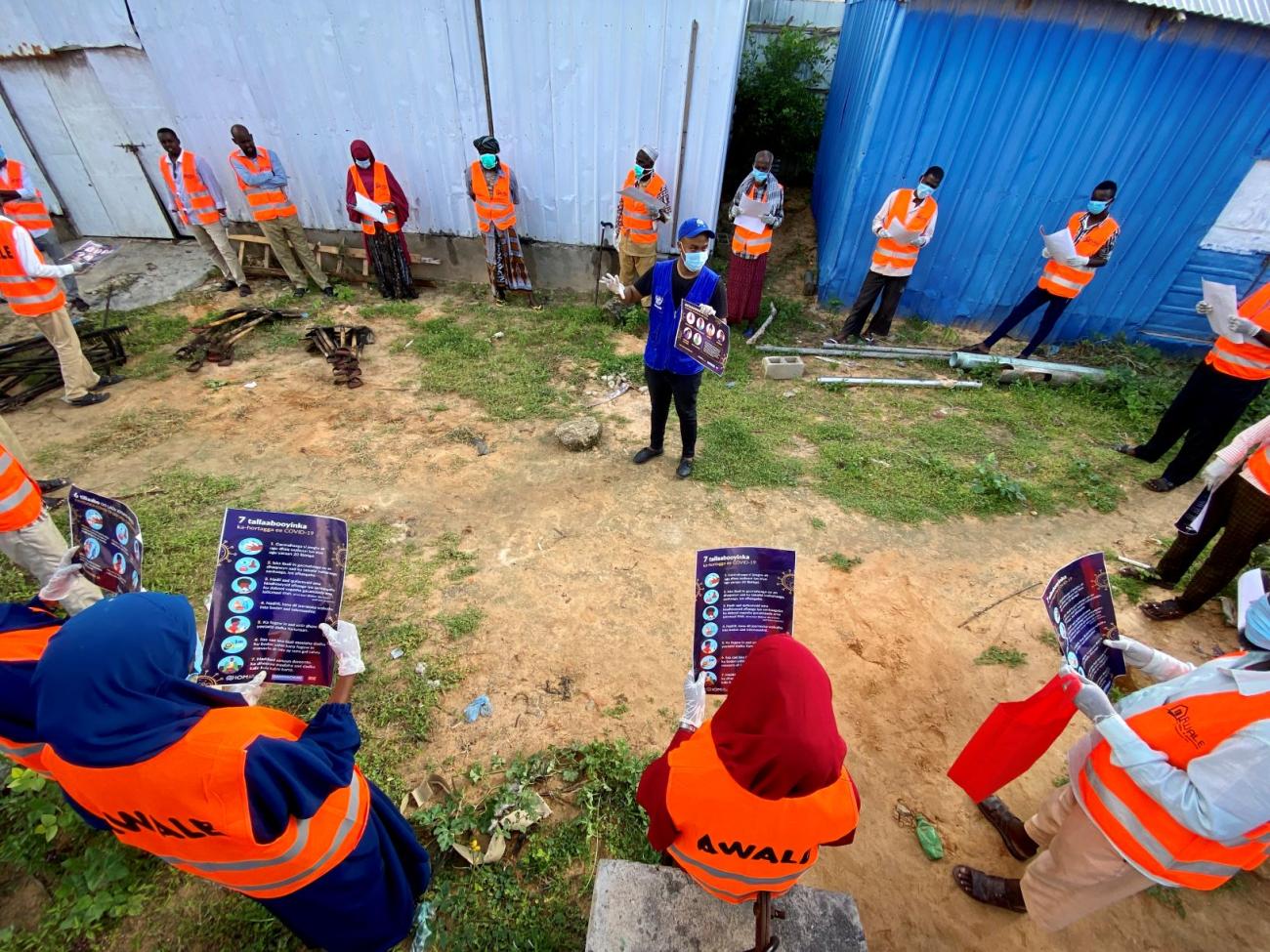
Facts will help to stop the spread the COVID-19 and associated stgma in Somalia
The lack of accurate, factual information about public health emergencies presents a very real and present risk for people in Somalia, especially among the estimated 2.6 million internally displaced persons (IDPs) and the thousands of migrants that transit through the country every year.
Health messages broadcasted through media outlets do not reach everyone. Rumours and hearsay spread faster than any virus, putting people’s lives in danger and bringing stigma and shame to those who contract COVID-19.
These are features of the COVID-19 pandemic response which has produced 3,212 positive cases in Somalia and claimed the lives of 93 people since March. While COVID-19 awareness is generally high here, recent findings from the International Organization for Migration (IOM) show that four months after the first confirmed case, there are still many vulnerable populations who have not received this information, particularly those living in displacement sites. Worse still, misconceptions about how the disease spreads remain pervasive across the country.
Many young migrants crossing into Somalia, mainly from Ethiopia, told IOM that they were unaware of the COVID-19 pandemic. When surveyed in March, IOM found that only 19 per cent had heard about the disease. This number has increased to 46 per cent since the exercise started.
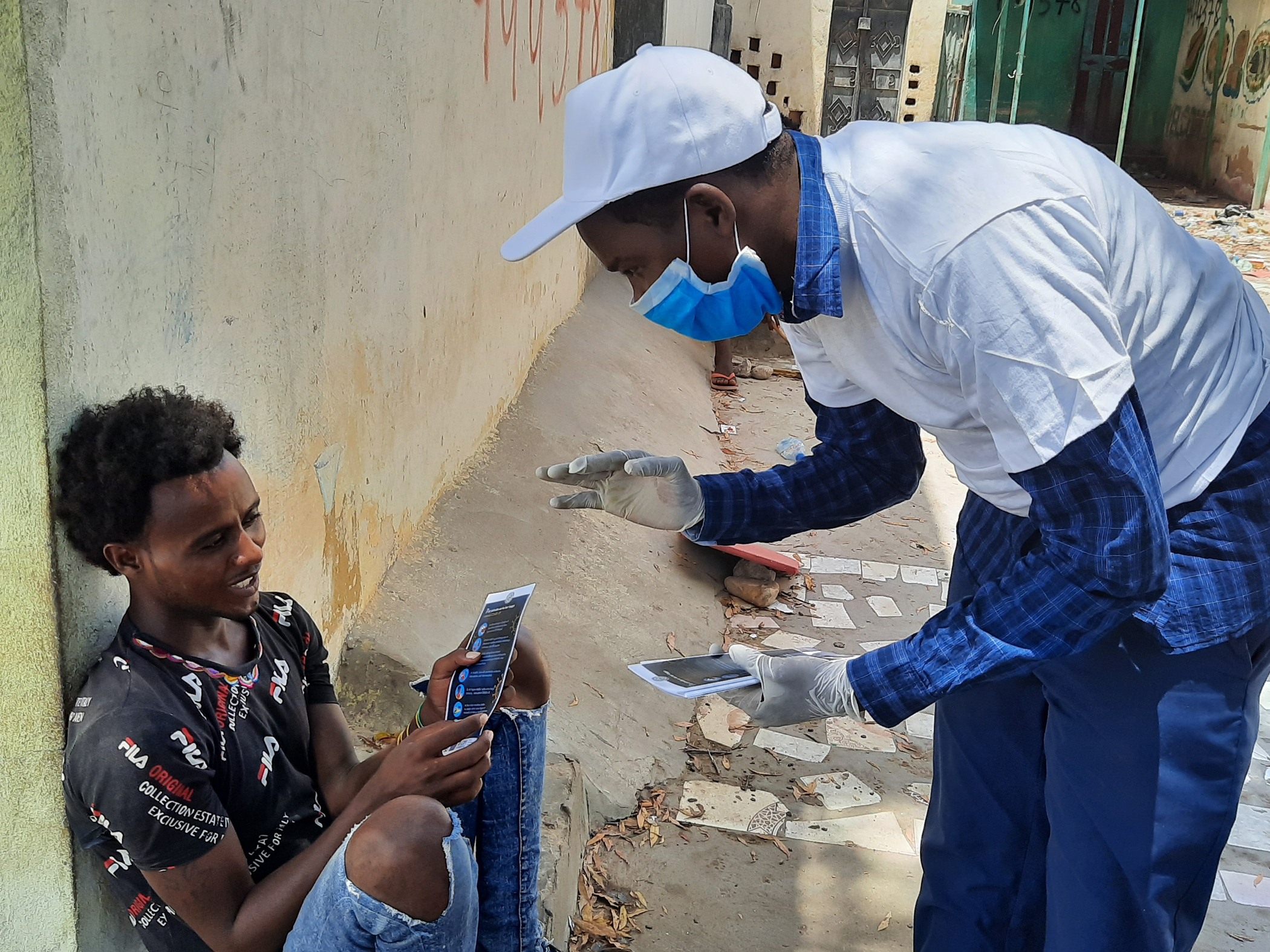
IOM distributes flyers and posters about COVID-19 in the port city of Bossaso to raise awareness about the virus among stranded migrants. Every year scores of migrants, mainly from landlocked Ethiopia, pass through Bossaso seeking to cross the Gulf of Aden to war-torn Yemen, and hoping to proceed onward to Gulf countries, particularly Saudi Arabia. COVID-19 has left many stranded in Somalia where they face precarious conditions. IOM is supporting them with water, sanitation, shelter, or food through the Migration Response Centres (MRCs). © IOM Somalia 2020
Thirty-two per cent IDPs in two sites in Mogadishu told a separate IOM Somalia assessment in May, that they knew nothing about the disease. In Hargeisa and Kismayo, two of the largest urban centres in the country, many people believe that mosquito bites and blood transfusions are among the main conduits for COVID-19.
Such misinformation is fuelling stigmatization, a major obstacle to reducing infection rates. Anecdotal evidence from IOM staff indicates that in some IDP sites, people wearing a face masks are accused of being carriers of the virus and therefore many refrain from wearing them.
“If you wear a mask people think you have the disease and run away,” said Mohamed, a 45-year-old caretaker living in a settlement for displaced persons in Kismayo.
“I’ve heard people saying things like ‘coronavirus only attacks the community leaders, the rich and white people’. Some even think that the face masks are bringing the virus because they are imported from abroad.”
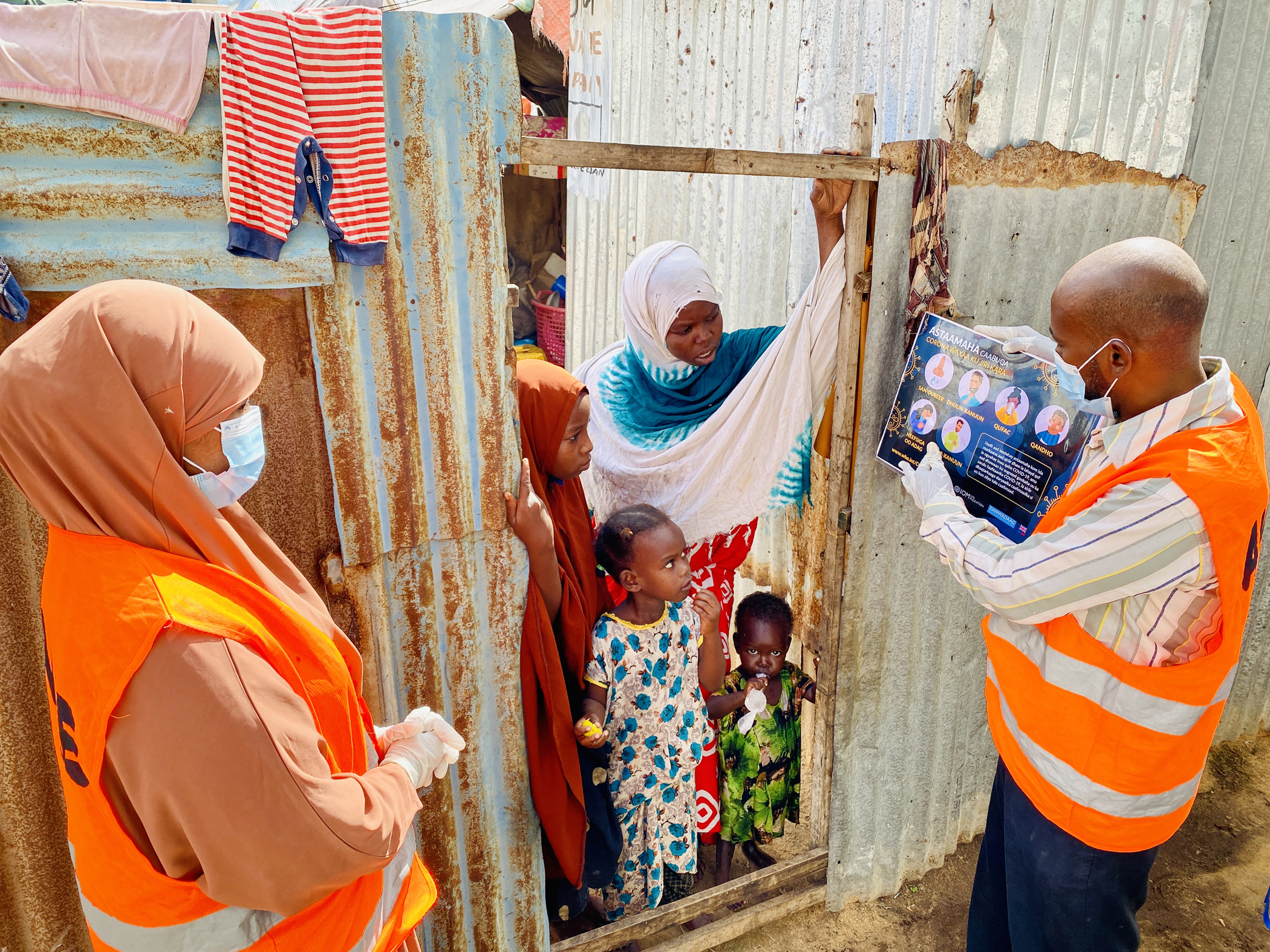
IOM staff sensitizes a community member living in a displacement site in Mogadishu. The city hosts half of the internally displace persons (IDPs) living in Somalia that have been forced to flee due to years of conflict and climate shocks. © Hamza Osman/IOM Somalia 2020
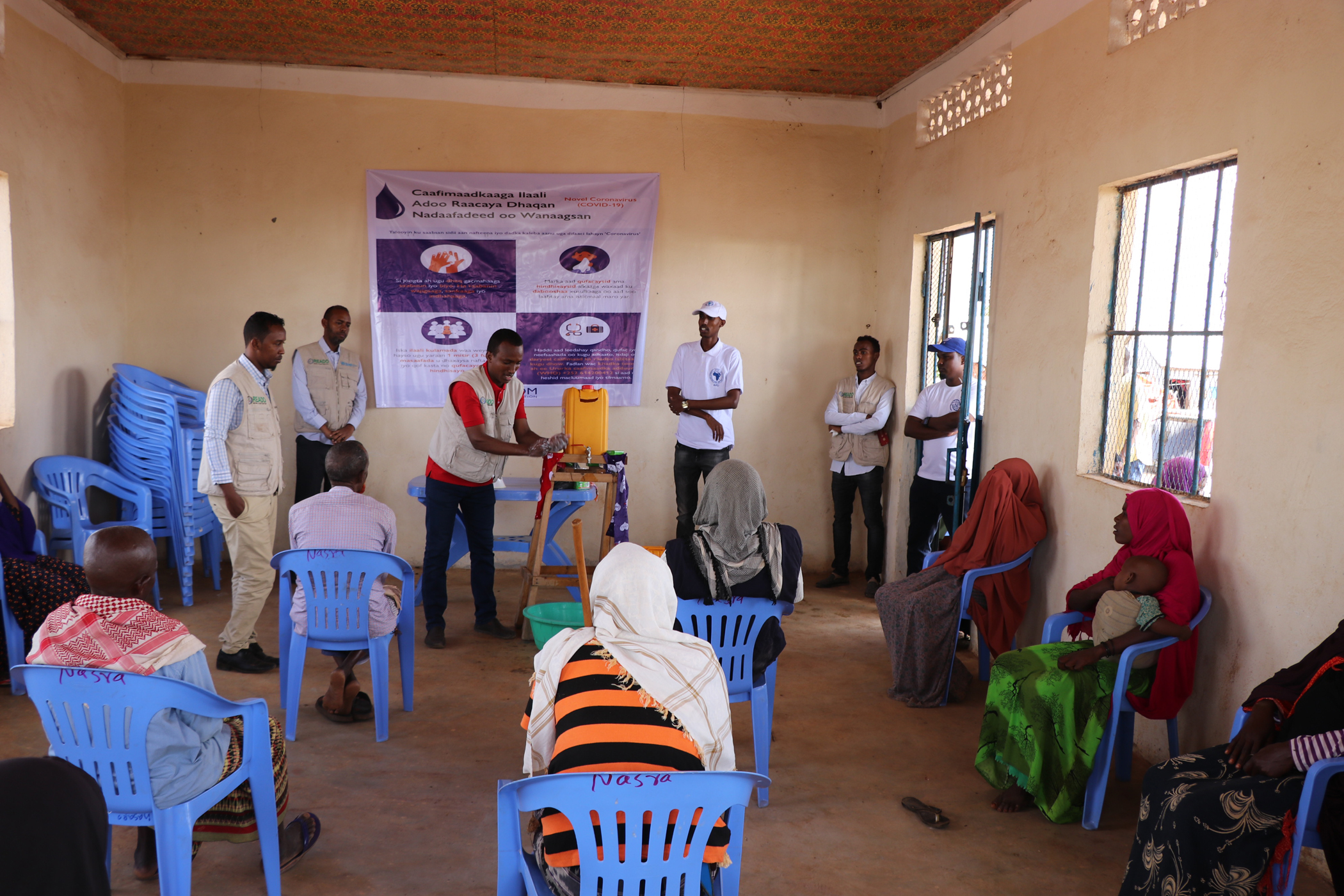
IOM hygiene promotors demonstrate handwashing techniques to community leaders in a displacement site in Baidoa. There are 2.6 million internally displace persons (IDPs) living across Somalia, the majority living in informal settlements, due to years of conflict and climate shocks. © IOM Somalia 2020
According to Fatuma, a 40-year-old housewife living in the same IDP site, many people think that “the coronavirus can be cured with local remedies,” so even when people present the symptoms, they hesitate to seek medical advice for fear of being stigmatized and quarantined.
IOM is deeply concerned about the virulent global spread of anti-migrant xenophobia, scapegoating and violence. An Issue Brief (Countering Xenophobia and Stigma to Foster Social Cohesion and the COVID-19 Response and Recovery) released last week advocates for the creation of solid legal and policy frameworks aimed at preventing it, sanctioning those responsible, and promoting community-based approaches to reduce prejudice and facilitate social cohesion like those being applied in Somalia
Misinformation as the catalyst for COVID-19 stigma
Muna is a 27-year-old returnee migrant from Mogadishu who suffered through COVID-19 and the stigma perpetuated by those in her community. She recounted her experience to IOM, as she does not want others to suffer from a lack of accurate information.
Muna began experiencing COVID-19 symptoms, coughing and episodes of intense fever, after returning from her cousin’s wedding in Baidoa, a city around 200 km southeast of Mogadishu. None of her family members suspected that she might have contracted coronavirus.
“I heard about the virus in the media at the beginning of April but nobody in my community was concerned about it,” said Muna. “I decided to self-isolate at home, but my family continued to interact with me even though I tried to keep some distance.”
Luckily, close friends suggested she visit the hospital after noticing her deteriorating health.
Muna tested COVID-19 positive on 21 April and was admitted to the De Martino Hospital in Mogadishu, the main referral public hospital in Somalia treating patients suffering from the coronavirus.IOM has supported the hospital since the beginning of the health crisis with the donation of ventilators, oxygen concentrators, personal protective equipment and funded the deployment of medical specialists. Somalia has one of the most fragile health systems in the world due to years of conflict and instability, and some of the equipment donated by IOM was critical to save Muna’s life.
Due to Muna’s asthma-like condition the healthcare personnel took very strict measures to ensure her recovery. Sadly, Muna’s father also caught the virus and was admitted in the same hospital with her.
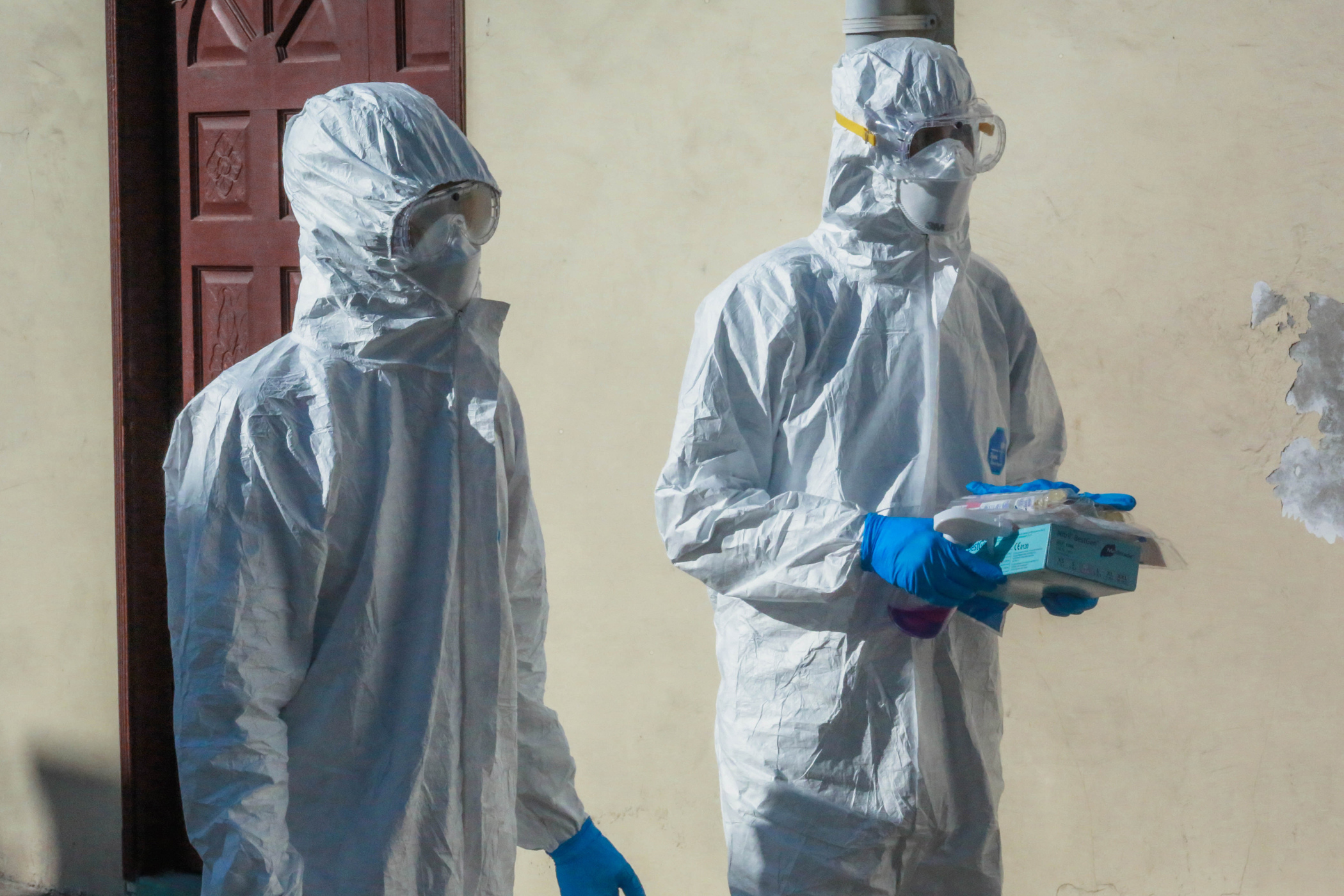
Dr. Abdiaziz, Director of De Martino Hospital and IOM Migration for Development in Africa (MIDA) diaspora expert monitors the state of a COVID-19 patient with his colleague at the hospital. The De Martino Hospital provides free health care to IDPs and other vulnerable groups. In May, the hospital made an appeal for urgent help to address the escalating healthcare needs. © IOM Somalia 2020

IOM staff tests one of the ventilators donated to De Martino Hospital by IOM to fight against COVID-19. © IOM Somalia 2020
Apart from the ill-effects of COVID-19 on her physical health, Muna and her family suffered social stigma from their very own community. Their neighbours started to make disparaging and inaccurate comments about the family and even told their children to stop playing with Muna’s children because they are a “COVID-19 family”.
“I felt ashamed because I was sick; some people even named me ‘Muna corona’,” Muna told IOM staff at the hospital.
For three weeks Muna had to use one of the oxygen concentrators donated by IOM to breathe. She thought she wouldn’t survive.
“I was so scared. Before coming to the hospital, I heard people saying that the virus doesn’t have any cure,” she recalled.
Muna experienced sleeping problems and nightmares due to the stigmatization. But despite the rumours that made her fear for her life, Muna and her father’s health improved, and they returned home to their family.
Muna is now raising awareness among her community to combat stigma.
“I’m highly encouraging my community to strictly adhere to the prevention rules of COVID-19 shared by health agencies and showing them that you can recover from the disease and have a normal life again,” she said.
Supporting each other to combat stigma
IOM has followed-up on Muna’s case since she was admitted to the hospital and now provides her with bi-weekly psychological support over the phone.
Elaine Duaman, the IOM Mental Health and Psychosocial Support (MHPSS) Specialist who is facilitating the counselling sessions for Muna and her family, says that “the constant support from Muna’s relatives while both family members were sick was fundamental for her psychological well-being and was helpful when facing the prejudices against them.”
But she emphasized that “the lone support from her family is not completely effective if the surrounding community is misinformed and not engaging in supportive and preventive measures against social stigma and COVID-19.”
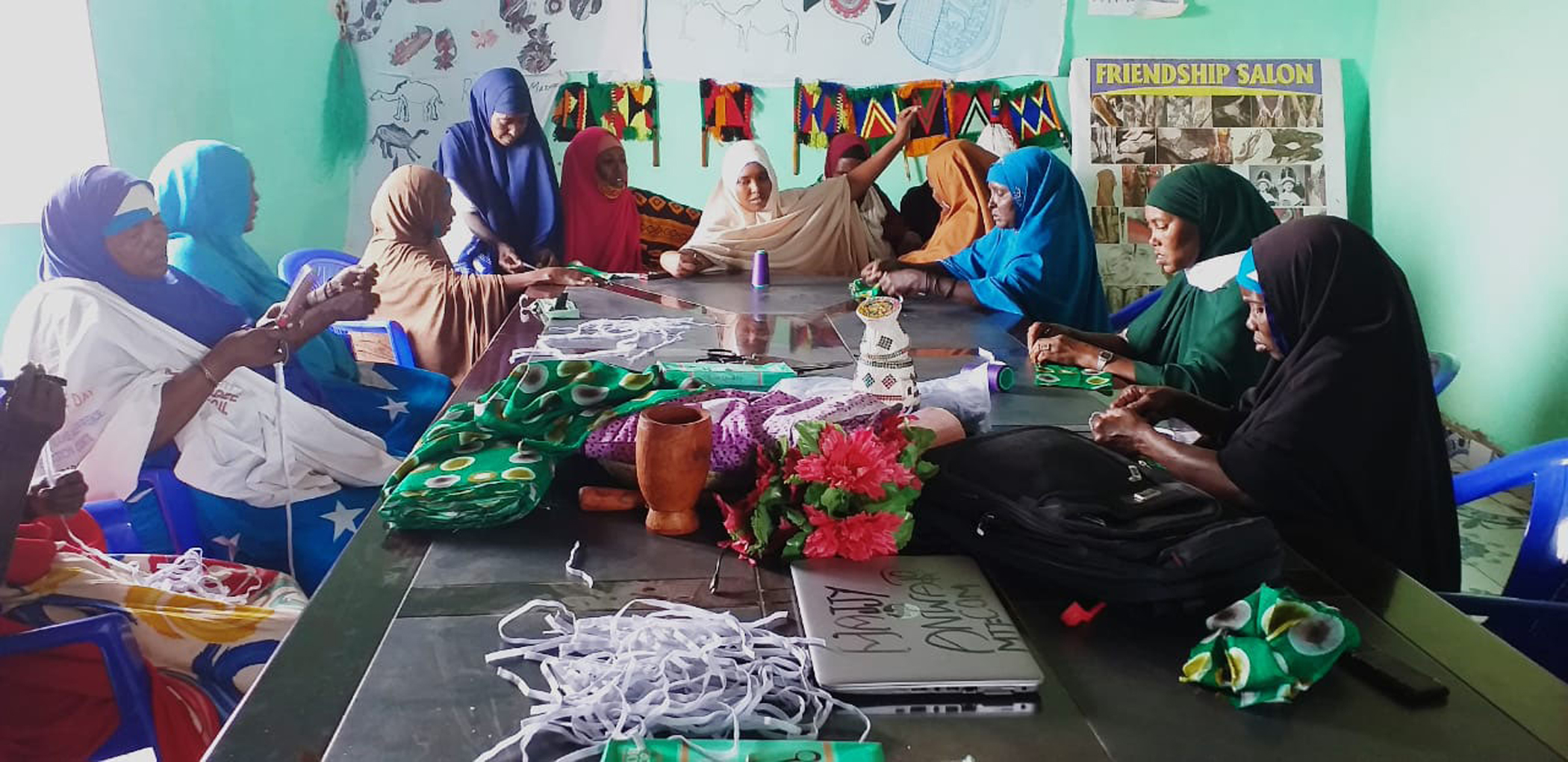
A group of women living in the displacement site of Doolow, a town bordering Ethiopia, design face masks for their community. Under the Women Participation Project, IOM is providing IDP women materials to create the masks to curb the spread of the deadly virus. The project seeks to promote the leadership and participation of women into their communities and empower them to take the decisions. © IOM Somalia 2020
The best way to combat stigma is by a systemic multi-layered approach, Elaine says. This means engaging influential community members to disseminate the right information that will later be passed down to other people, and for other community members to work in solidarity in their fight against COVID-19.
“We need to engage the role models in the community, those who have a positive influence and that people can listen to,” she said. “If they are on our side, the whole community will join them.”
This is the approach that IOM advocates when implementing social cohesion activities to raise awareness across Somalia. In Abudwaq, a small town in Galmudug State, IOM brought together 100
women mobilizers from different clans and from both displacement and surrounding host communities for a training on COVID-19 awareness and prevention measures to counter myths and discrimination.
“It is important to have an open discussion with the participants to clarify their uncertainties, allow people to analyse the information and find solutions together,” Elaine said.
Somalia is one of the only countries in the world that has created a special force to address the psychosocial needs of the population to help them deal with the pandemic. The multiple emergencies, disasters and ongoing conflict and instability that the country has suffered during the last decades have negatively impacted the mental health of its population.
IOM believes that mental health and psychosocial support services are an imperative to combat the underlying issues on social stigma brought by misinformation and that can potentially target vulnerable groups including migrants and internally displaced persons. These groups are at an increased risk of mental disorders and psychological distress as they are already dealing with protection risks, bleak socioeconomic prospects, unequal access to healthcare and basic social services, precarious housing and tenuous living and working conditions.
In the coming month, IOM plans to engage 20 religious leaders in COVID-19 response activities to help spread life-saving information to IDPs and other vulnerable groups. In Somalia, a country whose population is 99 per cent Muslim, the mosque and Imams are the first responders and the most positively influential figures in their communities, the people whose advice and guidance is sought for a wide variety of life issues.
IOM works closely with the Federal Government of Somalia (FGS) to support their COVID-19 response efforts and since March has reached over 700,000 migrants, IDPs, returnees and communities in hard to reach areas with awareness raising activities to counter myths and rumours about the virus. IOM is also leading the Points of Entry Pillar and Psychosocial Support Pillar established by the FGS inside the National Response Plan for COVID-19. IOM is the only international organization in Somalia deploying psychosocial support specialist to provide technical support in the country’s COVID-19 response.
IOM’s support to the COVID-19 response efforts in Somalia
Somalia’s health system infrastructure remains extremely fragile and frontline healthcare workers at De Martino Hospital are doing their best to control the disease, but the needs for equipment are still immense.
IOM partnered with the Somalia’s Ministry of Health and Human Services for the launch of #SomaliaResponds, an individual-giving campaign to raise funds for needed supplies to save lives and curb the spread of COVID-19 in Somalia. To date, IOM has donated 20 ventilators to set up an intensive
care unit at the De Martino Hospital, provided medical specialists, and equipment such as personal protective equipment, including masks and gloves to health clinics across the country.



